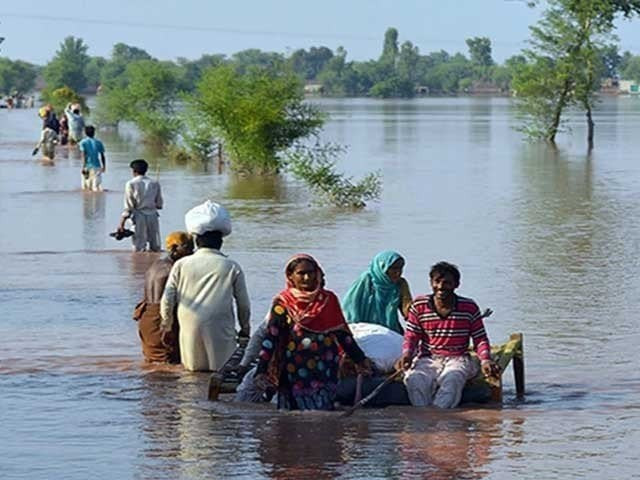Worst floods since independence caused over $32 billion losses, WB initial estimates
Devastating floods adversely impacted 33 million people and inundated 15% of the country, causing major hardships

The World Bank-led Post Damage and Need Assessment exercise has initially estimated the cost of flood damages and direct losses over $32 billion while 16 out of the 20 poorest districts of Pakistan have been hit the hardest.
Despite colossal losses, which are three times more than the 2010 super floods losses, the World Bank on Friday emphasized maintaining the tight monetary policy, fiscal consolidation path and a flexible exchange rate regime.
The initial estimates were presented first to the Minister for Planning and Development Ahsan Iqbal on Friday. Shortly after that, the staggering numbers were shared with the international community in Washington through a video link in a flood response conference. The conference was co-chaired by the WB and the United Kingdom on the sidelines of the WB/IMF Annual Meetings.
“The climate disaster has turned into hyper poverty and hyper malnutrition”, said Ahsan Iqbal while talking to The Express Tribune.
The minister said that the preliminary estimates showed that the total losses were over $30 billion but the figure may undergo some further changes in light of estimates of the housing and transport sectors.
The sources said that the cost of the damages has been provisionally estimated at $13 billion while another $19 billion is the cost of the direct losses. Only direct economic losses have been assessed for one year period.
“16 out of 20 poorest districts of Pakistan have been hit the hardest by the floods, which Pakistan cannot alone handle due to the magnitude of the crisis”, said Ahsan Iqbal.
The officials said that the replacement cost will be almost half of the total cost of the damages and direct losses and is assessed at around $16.2 billion. This will be the money that Pakistan will be looking for from the international community.
The comprehensive post-damage and need assessment exercise has been undertaken in collaboration with the World Bank, the Asian Development Bank, European Union (EU) and the United Nations (UN).
Read Flood victims return home to start from zero
Once the damages and the direct losses numbers are further fine-tuned, the government will formally release the report on October 24th, said Ahsan Iqbal.
Finance Minister Ishaq Dar who is in the United States physically attended the donors' conference and also stated that the total loss figures might increase once the final figures are ready.
During his meetings with the World Bank, the International Monetary Fund and the United States administration, Finance Minister Ishaq Dar has got an encouraging response for securing loans for the flood-affected population.
The devastating floods have adversely impacted about 33 million people and inundated 15% of the country, causing major hardships in the provinces of Sindh and Balochistan.
The lenders have assessed the damages and the losses under four broader clusters including the social sector, infrastructure and economy.
The initial data provided by the provinces and the federal agencies for the Post Damage and Need Assessment suggested up to $47 billion in cost of damages and losses. However, during the validation exercise, the duplications were erased, bringing down the figure to around $32 billion.
The preliminary assessment is close to the government’s figure of $28 billion to $30 billion, although some had feared that the figures could touch $40 billion.
The Planning Commission had worked out a $28 billion cost that included the $11 billion losses on account of slower than the targeted growth rate of 5%. The Ministry of Finance first gave $10 billion to $12 billion initial estimates of the damages and then revised the figure to $18 billion.
Read Floods wipe out crops worth Rs529 billion
“It is the time for the richest people of the world to help the poorest people of Pakistan who are the victims of the development of the advanced world”, said Iqbal while talking to The Express Tribune. Pakistan complains that its contribution to global emissions is less than 1% but it is made the victim of development in the advanced world.
While speaking at the conference, a senior World Bank official said that Pakistan’s foreign exchange position remains uncomfortable and the country’s imports will increase due to more imports of food and cotton.
Pakistan faces a narrow tunnel to economic stability and sounder economic management must be maintained, the World Bank representative informed the gathering of the donors.
The WB official urged Pakistan to avoid untargeted subsidies, undertake energy and general sales tax harmonization reforms and implement a flexible exchange rate regime.
During the conference, the World Bank hoped that floods impact can be managed with consistent and sound economic policies
The IMF representative in the donors' conference stated that inflation in Pakistan will remain high and the floods have put additional pressure on the current account deficit. The IMF too stressed that Pakistan has a very narrow path to recovery and should remain focused.
The Planning Commission stated that inflationary pressures were expected to further aggravate due to supply chain disruptions and shortage of perishable items.
As against the average inflation target of 11.5%, the inflation is expected to remain between 23-25%, according to the Planning Commission.
The Planning Commission estimates a loss of 1.8 to 2 million jobs. On average poverty may increase by 4.5 to 5%, implying that 9 to 12 million people will fall below the poverty line, according to the Planning Commission.
However, in its Pakistan Development Update report, the WB has lowered its additional poverty due to the floods in the range of 2.5% to 4%, assessing a total of 40% population living below the poverty line.



















COMMENTS
Comments are moderated and generally will be posted if they are on-topic and not abusive.
For more information, please see our Comments FAQ